Posted: July 16th, 2012 | Author: Sven | Filed under: EDaWaX, Projects | Tags: Data Policies, WP2 | Comments Off on Data Policies in Economic Journals: What Data Authors have to provide beside the Manuscript?
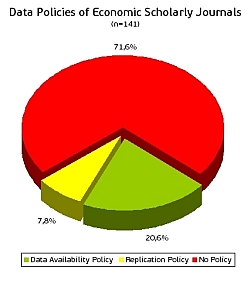 As mentioned in some of my previous blogposts we analyzed more than 140 economic scholarly journals regarding their data availability policies. It has been an interesting work checking the quality and the extend of these data policies.
As mentioned in some of my previous blogposts we analyzed more than 140 economic scholarly journals regarding their data availability policies. It has been an interesting work checking the quality and the extend of these data policies.
In our sample (that was evaluated in 2011 by the German Economics Bräuninger, Haucap and Muck regarding the reputation and relevance of these journals) we were able to find 29 journals equipped with a data availability policy and 11 journals that own a so called “replication policy”.
Read the rest of this entry »
Posted: June 13th, 2012 | Author: Sven | Filed under: Projects, Report | Tags: big data, humanties, social sciences | Comments Off on Big Data in the Humanities and Social Siences? Yes – there’s a bunch of it!
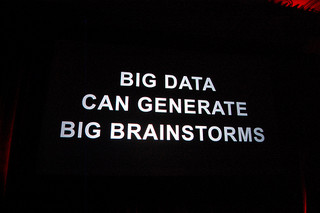 The Council on Library and Information Resources (CLIR) issued the first public appraisal of the Digging into Data Challenge, an international grant programme first funded by JISC, the US National Endowment for the Humanities (NEH), the US National Science Foundation and the Canadian Social Sciences and Humanities Research Council.
The Council on Library and Information Resources (CLIR) issued the first public appraisal of the Digging into Data Challenge, an international grant programme first funded by JISC, the US National Endowment for the Humanities (NEH), the US National Science Foundation and the Canadian Social Sciences and Humanities Research Council.
Their findings are presented in a report called One Culture – Computationally Intensive Research in the Humanities and Social Sciences, along with a series of recommendations for researchers, administrators, scholarly societies, academic publishers, research libraries, and funding agencies.
Read the rest of this entry »
Posted: May 7th, 2012 | Author: Sven | Filed under: Projects, Research Data | Tags: RDM, Research Data, tools | Comments Off on Digital Curation Centre refreshed their catalogue of tools and services
 The Digital Curation Centre (DCC) has just refreshed and replenished their catalogue of tools and services for managing and curating research data.
The Digital Curation Centre (DCC) has just refreshed and replenished their catalogue of tools and services for managing and curating research data.
Beside a new look the catalogue has been overhauled to focus on software and services that directly perform curation and management tasks.
Read the rest of this entry »
Posted: April 16th, 2012 | Author: Sven | Filed under: Projects | Tags: data repositories, project | 8 Comments »
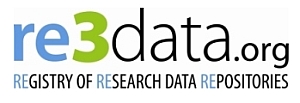 On Friday I read some news about the project re3data.org. This introduction may be interesting for our readers too, so I ‘m documenting the press release here:
On Friday I read some news about the project re3data.org. This introduction may be interesting for our readers too, so I ‘m documenting the press release here:
More and more universities and research centres are starting to build research data repositories allowing permanent access to data sets in a trustworthy environment. Due to disciplinary requirements, the landscape of data repositories is very heterogeneous. Thus it is difficult for researchers, funding bodies, publishers and scholarly institutions to select appropriate repositories for storage and search of research data.
The goal of re3data.org is to create a global registry of research data repositories.
Read the rest of this entry »
Posted: March 8th, 2012 | Author: Sven | Filed under: Projects | Tags: Data Sharing, Datasets, Open Data | Comments Off on Open Economics Workgroup provides information and data sets
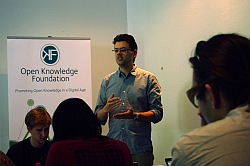 Since spring 2011 the Open Economics Workgroup is active in the UK and beyond. The workgroup is run by the Open Knowledge Foundation in association with the Centre for Intellectual and Property Law (CIPIL) at the University of Cambridge.
Since spring 2011 the Open Economics Workgroup is active in the UK and beyond. The workgroup is run by the Open Knowledge Foundation in association with the Centre for Intellectual and Property Law (CIPIL) at the University of Cambridge.
The members of the working group consist of leading academics and researchers, public and private sector economists, representatives from national and international public bodies and other experts from around the world.
Read the rest of this entry »
Posted: February 20th, 2012 | Author: Sven | Filed under: Projects | Tags: government, Open Data | Comments Off on Berlin publishes strategy for Open Data of the public administration
 On Friday, Stefan Krempl wrote an article for heise.de about the new strategy of the Senate of Berlin to extend its Open Data Portal. Open Data Berlin is the first open data project in Germany for the public administration. In the UK this is much more common and already a regular service.
On Friday, Stefan Krempl wrote an article for heise.de about the new strategy of the Senate of Berlin to extend its Open Data Portal. Open Data Berlin is the first open data project in Germany for the public administration. In the UK this is much more common and already a regular service.
In Berlin, the Senate published a strategy document in cooperation with the Fraunhofer-Institute FOCUS, where the future of the project is designed – including demands for better organizational structures, coherent metadata schema and useful applications.
In the medium term, all enactments and protocols -if not classified as confidential- should be made available to the public on the platform.
In their paper, Fraunhofer proposes to publish these documents in open formats only – a useful attempt especially when we’re thinking about the long-term preservation of these data.
Beside textual documents, datasets of the public administration and applications are also published.
Read the rest of this entry »
Posted: January 6th, 2012 | Author: Sven | Filed under: Data Sharing, Projects | Tags: data publication | Comments Off on Introducing DRYAD
 Today I want to introduce Dryad – maybe many of you know it already because it is not a project that has just started, but a repository that was initially released in 2008.
Today I want to introduce Dryad – maybe many of you know it already because it is not a project that has just started, but a repository that was initially released in 2008.
As mentioned, Dryad is an international repository of data underlying peer-reviewed articles in the basic and applied biosciences, including biomedicine.
Dryad enables scientists to validate published findings, explore new analysis methodologies, repurpose data for research questions unanticipated by the original authors, and perform synthetic studies.
Dryad is governed by a consortium of journals that collaboratively promote data archiving and ensure the sustainability of the repository. Actually, Dryad contains 1228 data packages and 2953 data files, associated with articles in 100 journals.
Read the rest of this entry »
Posted: January 2nd, 2012 | Author: Sven | Filed under: Projects | Tags: Linking Data and Publications | 1 Comment »
 In early December 2011 the Open Aire Plus Project was launched – the project is designed to run 30 months and is funded by the EU. The aim of the project is providing cross-links from publications to data and funding schemes.
In early December 2011 the Open Aire Plus Project was launched – the project is designed to run 30 months and is funded by the EU. The aim of the project is providing cross-links from publications to data and funding schemes.
OpenAireplus brings together 41 pan-European partners, including three cross-disciplinary research communities.
The project will build on the efforts of the OpenAIRE Project, that enables Researchers to deposit their research publications that were funded by ERA or FP7 into OA-Repositories.
In the copurse of the project, the current publication repository networks will be expanded to attract data providers from domain specific scientific areas.
Creating a robust, participatory service for the cross-linking of peer-reviewed scientific publications and associated datasets is the principal goal of OpenAIREplus. As scholarly communication touches upon many disciplines, the project’s horizontal outreach will facilitate collaboration across data infrastructures, providing information to scientists, non-scientists as well as to providers of value-added services. The project will establish an e-Infrastructure to harvest, enrich and store the metadata of Open Access scientific datasets. Underlying technical structures will be deployed to support the management of and inter-linking between associated scientific data.
Dr. Norbert Lossau, Scientific Coordinator of the project and Director of Goettingen State and University Library states:
“The participatory design of OpenAIREplus will seamlessly guide the researcher to Open Access research data. The experienced consortium will pave the way to support the research work of European scientists and open up the road to multi-disciplinary science”
Posted: December 21st, 2011 | Author: Sven | Filed under: Projects | Tags: access to data, microdata | Comments Off on DwB project invites researchers to apply for access to Secure Data Service
 The Data without Boundaries project (DwB) supports equal and easy access to official microdata for the European Research Area, within a structured framework where responsibilities and liability are equally shared.The project assumes that a comprehensive and easy-to-access research data infrastructure enables researchers to continuously produce cutting-edge research and reliable policy evaluations.
The Data without Boundaries project (DwB) supports equal and easy access to official microdata for the European Research Area, within a structured framework where responsibilities and liability are equally shared.The project assumes that a comprehensive and easy-to-access research data infrastructure enables researchers to continuously produce cutting-edge research and reliable policy evaluations.
Especially the existing wealth of official microdata, currently under-used and held behind national, legislative, technical, and cultural borders is an important source for science and research. DwB claims that these borders can be crossed over with cooperation and political will.
DwB contributes to the creating of an integrated model where the best solutions for access to official statistical microdata are available, irrespective of national boundaries, yet flexible enough to fit national arrangements.
DwB aims to enhance researchers’ transnational access to official micro data through coordination of existing infrastructures, as the Council of European Social Science Data Archives (CESSDA) and the European Statistical System (ESS).
Read the rest of this entry »
Posted: December 14th, 2011 | Author: Sven | Filed under: Projects | Tags: Research Data Management; Tools, UK | Comments Off on Project DaMaRO at University of Oxford
 DaMaRO (Data Management Rollout at Oxford) is a collaborative project between several departments within the university: Oxford University Computing Services, the Bodleian Libraries, and Research Services. It is funded by JISC and will run until March 2013.
DaMaRO (Data Management Rollout at Oxford) is a collaborative project between several departments within the university: Oxford University Computing Services, the Bodleian Libraries, and Research Services. It is funded by JISC and will run until March 2013.
The aim of the project is creating a research data management policy for the University and the infrastructure to enable researchers to comply with it.
DaMaRO will take the outputs of the various research data management project that the University has been engaged in over the last few years and combines them into a better-integrated suite of tools and discovery mechanisms that will support researchers throughout the data life-cycle, from planning to re-use.
Of particular note is the ‘DataFinder’ tool that DaMaRO will be developing. This will enable the discovery of data hosted in various places around the University and beyond.
Behind the scenes, DataFinder will be able to automatically gather metadata from each of the tools and repositories it connects to, assign DOIs where they are not already assigned, and ensure that the metadata complies with the national DataCite standards. Furthermore, DataFinder will make the metadata it gathers available as linked data, and also map it to the CERIF standard, so that alerts can be issued to compatible research management systems when new project outputs are made available.
Beside software development, the DaMaRO Project will develop data management trainings and documentations for researchers.
Posted: December 5th, 2011 | Author: Sven | Filed under: Projects | Tags: biosciences, Citation, demonstrator, DOI, interviews, journals | 1 Comment »

The
SageCite project, funded by JISC, is releasing interviews with the editors of two leading journals in the Biosciences. The two interviews explore a large range of issues concerning data, scholarly communications and publishers, the links between data and publications and interoperability between data repositories and publishers.
SageCite developed and tested a Citation Framework linking data, methods and publications; Citations of complex network models of disease and associated data have been embedded in leading publications, exploring issues around the citation of data including the compound nature of datasets, description standards and identifiers.
The project worked through a number of workpackages comprising:
* Review and evaluation of options and approaches for data citation
* Understanding the requirements for citing large-scale network models of disease and compound research obejcts
* Demonstration of a citation-enabled workflow using a linked data approach
* Benefits mapping using the “Keeping Research Data Safe 2” taxonomy
* Technical and policy implications of citation by leading publishers
* Dissemination across communities (bio-informatics and research and information communities)
The results of these workpackages are published here – the project now has concluded.
Posted: November 29th, 2011 | Author: Sven | Filed under: Projects | Tags: Linking Data and Publications | Comments Off on GESIS: Integration of Research Data and Literature in the Social Sciences
 Today I want to introduce another project of the 27 projects that are funded by the German Research Foundation (DFG) in a call on “Information Infrastructure for Research Data”.
Today I want to introduce another project of the 27 projects that are funded by the German Research Foundation (DFG) in a call on “Information Infrastructure for Research Data”.
This project is InFoLiS (Integration von Forschungsdaten und Literatur in den Sozialwissenschaften / Integration of Research Data and Literature in the Social Sciences) – managed by GESIS, the Leibniz Institute for the Social Sciences.
Intensifying the interconnectedness between digital information systems and their respective data sources is a major issue in the digital era and constitutes an important demand for the supply of scientific information. Missing links between resources require scientists conducting empirical research to manually search full texts of publications for references to the underlying data sources. These references are not cited in a standardized manner. Information about the referenced data sources can only be accessed using separate and structurally distinct information systems. This procedure is not only time consuming, but the inconsistency and sometimes incompleteness of citations may also hamper or even impede data retrieval. Because of this, linking metadata of publications and studies and making them accessible directly via joint information systems constitutes an important task.
GESIS and the Mannheim University Library aim to achieve this objective in the InFoLiS project. Study data administered by GESIS shall be linked to publication data provided by Mannheim University Library in order to extend and professionalize existing information systems. In the course of this project, various methods will be investigated and integrated into the involved systems. On this basis, the project will evaluate and recommend different approaches for data integration and thereby ensure the usability of the results for other universities and institutes engaging in Social Sciences.
Posted: November 17th, 2011 | Author: Sven | Filed under: Projects | Tags: Data Centers, Data Policies, Knowlegde Exchange | Comments Off on “Surfboard for Riding the Wave” Report: Data availability policies of journals
 Additionally to my blogpost where I introduced the “Surfboard for Riding the Wave” report, I want to point out a single part of the report for this post:
Additionally to my blogpost where I introduced the “Surfboard for Riding the Wave” report, I want to point out a single part of the report for this post:
In Chapter 3.5, data availability policies of journals are discussed – a subject connected to the tasks of the EDaWax work package “Analysis of Data Policies”. Currently the EDaWax-Project is examining over 140 economic journals regarding their data availability policies.
Back to the “Surfboard”-Report: KE stated, that
“most peer-reviewed journals in science, technology and medicine have files where authors can add supplementary data related to the article, such as data sets, multimedia files, large tables, animations, and protocols.”
For example a study found out that the percentage of articles that contained supplementary materials increased from 7% in 2003 to 25% in 2009 – at least for the reviewed 28 high impact medical journals.
Read the rest of this entry »
Posted: November 11th, 2011 | Author: Sven | Filed under: Projects | Tags: Guidelines, RDM, Report | Comments Off on #rdtk_herts: First Project Report available
 The first monthly progress report of the project ‘Service Oriented Toolkit for Research Data Management‘ (aka #rdtk_herts) is available on the project website.
The first monthly progress report of the project ‘Service Oriented Toolkit for Research Data Management‘ (aka #rdtk_herts) is available on the project website.
The ‘Service Oriented Toolkit for Research Data Management‘ project, is running at University of Hertfordshire from October 2011 until March 2013.
The site also contains a brief introduction to the Toolkit and an article pointing to University of Hertfordshire’s data management policy, which the Toolkit seeks to enable.
University of Hertfordshire published new policy and guidelines for staff with regard to Data Management on September 1, 2011. Most of the policy and its appendices are available publicly on the University’s Policy and Regulation web site under Data Management Policy.
The most useful part of the policy for Researchers is the appendix: Guide to Research Data Management . This contains a checklist of questions, the answers to which lead to the formation of a good practice Data Management Plan and also facilitate the responses likely to be required by external funding bodies.
The production of further guidance and demonstration of commoditised services is one of the purposes of the Research Data Toolkit project, thereby helping researchers to ‘tick off’ their checklist, create successful bids, and establish and cement good data management.
The project team welcomes feedback and information from members of the Research Data Management community!
Posted: October 26th, 2011 | Author: Sven | Filed under: Projects | Tags: Citation, Datasets, Guide, Publications | Comments Off on Guide: How to Cite Datasets and Link to Publications
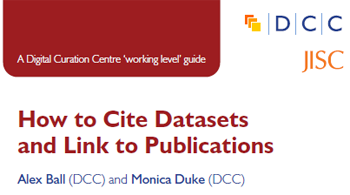 The Digital Curation Centre (DCC) has published another in its series of How- to Guides: ‘How to Cite Datasets and Link to Publications‘ by Alex Ball and Monica Duke of the DCC. It explains how researchers can create links between their publications and the underlying data, so that each can be found from the other.
The Digital Curation Centre (DCC) has published another in its series of How- to Guides: ‘How to Cite Datasets and Link to Publications‘ by Alex Ball and Monica Duke of the DCC. It explains how researchers can create links between their publications and the underlying data, so that each can be found from the other.
It also provides advice for repository managers and data archivists wishing to make their data holdings easier to cite.
The guide is available here.
 As mentioned in some of my previous blogposts we analyzed more than 140 economic scholarly journals regarding their data availability policies. It has been an interesting work checking the quality and the extend of these data policies.
As mentioned in some of my previous blogposts we analyzed more than 140 economic scholarly journals regarding their data availability policies. It has been an interesting work checking the quality and the extend of these data policies.
 The Council on Library and Information Resources (
The Council on Library and Information Resources ( The Digital Curation Centre (
The Digital Curation Centre (
 Since spring 2011 the
Since spring 2011 the  On Friday, Stefan Krempl wrote an
On Friday, Stefan Krempl wrote an  Today I want to introduce
Today I want to introduce  In early December 2011 the Open Aire Plus Project was launched – the project is designed to run 30 months and is funded by the EU. The aim of the project is providing cross-links from publications to data and funding schemes.
In early December 2011 the Open Aire Plus Project was launched – the project is designed to run 30 months and is funded by the EU. The aim of the project is providing cross-links from publications to data and funding schemes. The
The 
 The
The 
 Additionally to my
Additionally to my  The first monthly progress report of the project ‘Service Oriented Toolkit for Research Data Management‘ (aka #rdtk_herts) is available on the
The first monthly progress report of the project ‘Service Oriented Toolkit for Research Data Management‘ (aka #rdtk_herts) is available on the The
The 





